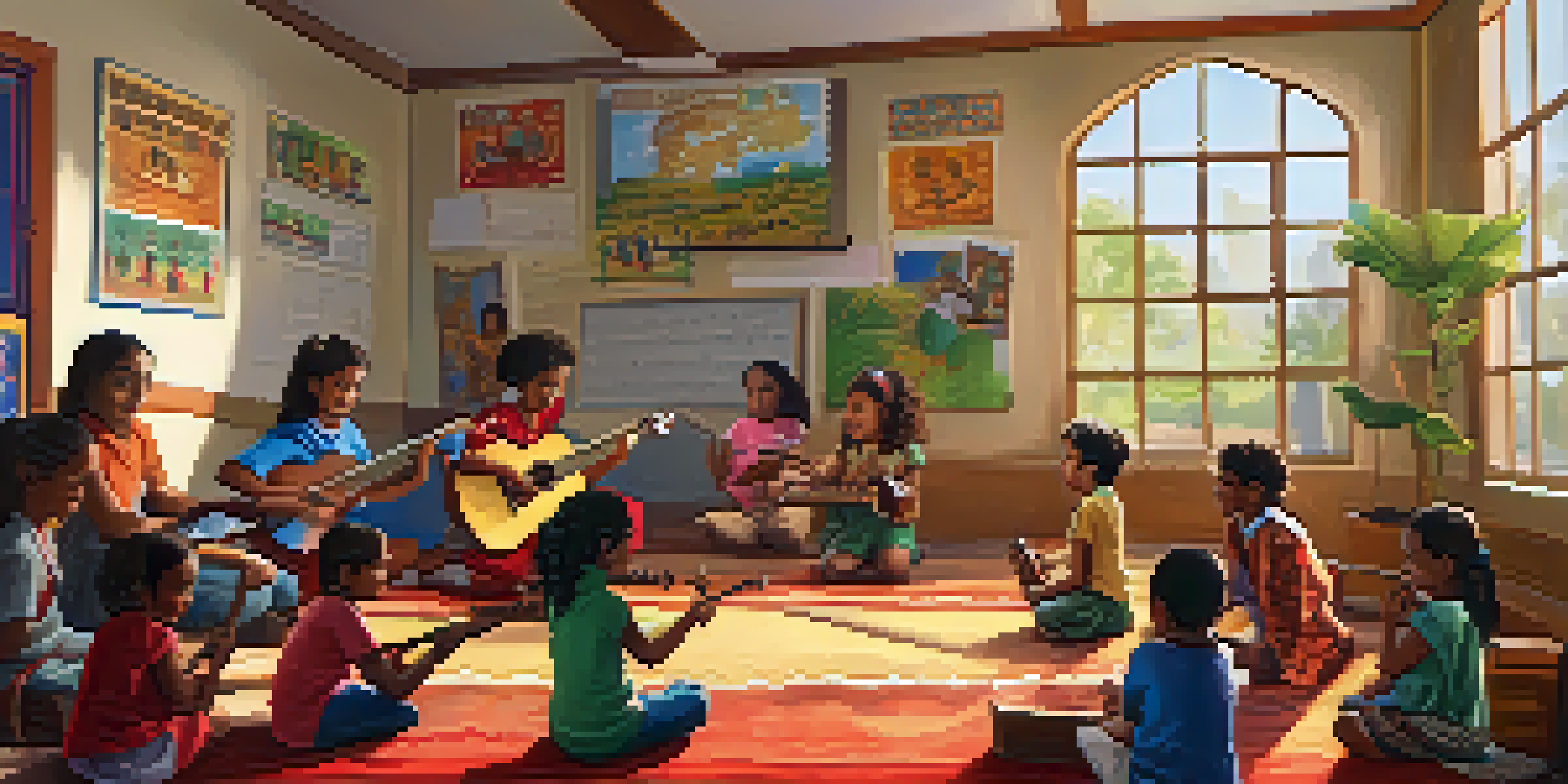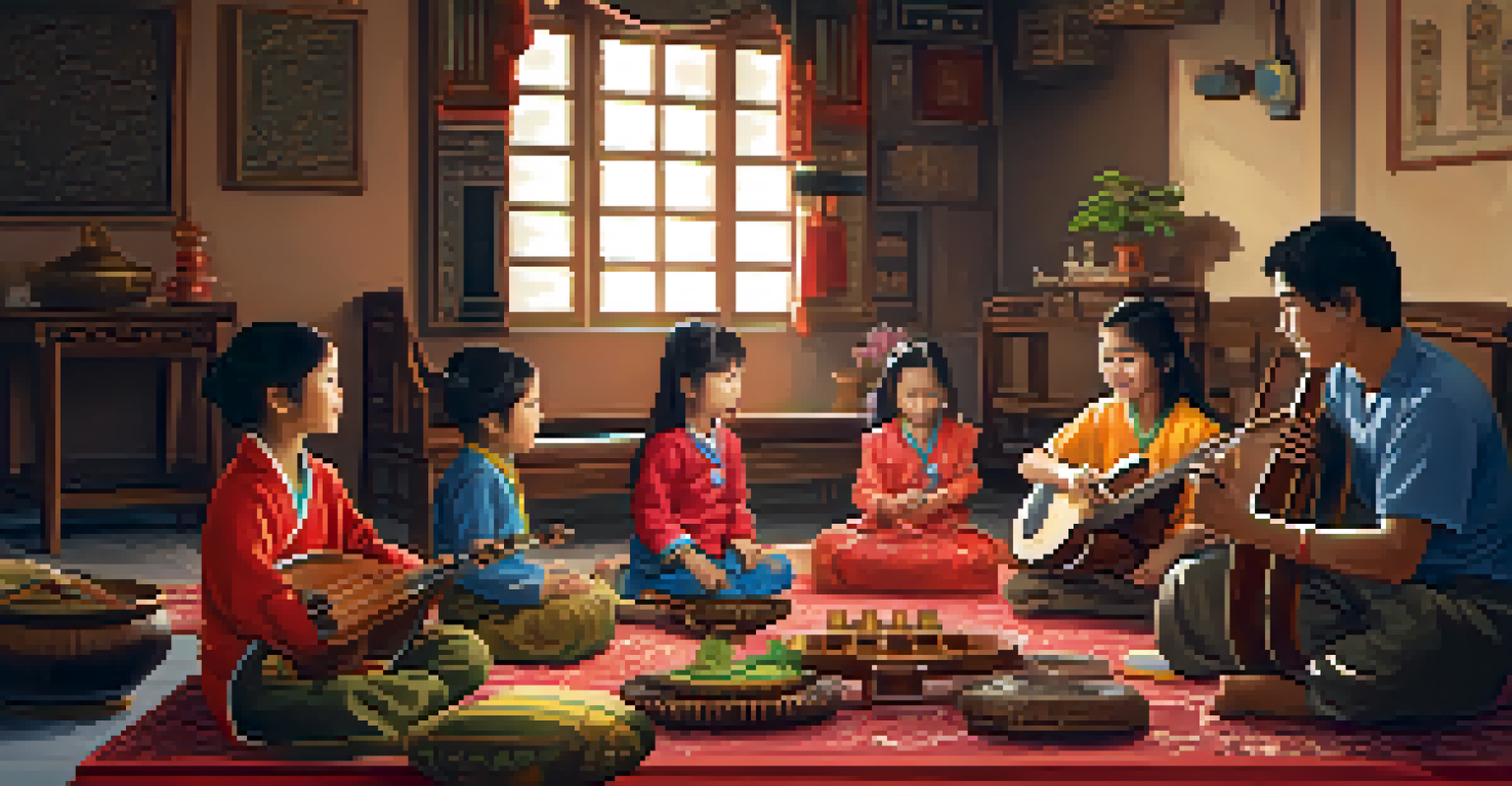Music's Influence on Cultural Awareness in Children

Understanding Cultural Awareness Through Music
Cultural awareness involves recognizing and respecting the diverse traditions and values of different communities. Music, as a universal language, plays a crucial role in this process. Through exposure to various musical styles, children can learn about the stories, struggles, and triumphs of other cultures.
Music can change the world because it can change people.
For example, a child listening to reggae might discover the history of Jamaica and its rich cultural heritage. This engagement creates a bridge, allowing them to connect with people from different backgrounds on a deeper level. Music can make cultural education feel less like a lesson and more like an adventure.
Ultimately, music helps children see the world through a broader lens, fostering empathy and understanding. This early exposure can shape their perspectives, making them more open-minded and accepting individuals as they grow.
Creating Inclusive Learning Environments with Music
Incorporating diverse music into educational settings promotes inclusivity. When children hear songs from various cultures, it validates those backgrounds and encourages a sense of belonging. This inclusion is essential in classrooms where kids come from different ethnicities and backgrounds.

For instance, a music class that features traditional African drumming alongside classical Western music allows students to appreciate both styles equally. Such experiences can break down barriers and foster friendships among children who might otherwise feel isolated due to their cultural differences.
Music Fosters Cultural Awareness
Exposure to diverse musical styles helps children learn about different cultures and fosters empathy.
By creating an inclusive learning environment through music, educators can help all students feel valued. This sense of belonging not only boosts confidence but also promotes collaboration and teamwork among diverse groups.
Music as a Tool for Cultural Exchange
Music serves as an excellent medium for cultural exchange, enriching children’s understanding of the world. When kids participate in music programs that include international songs, they often engage in discussions about the origins and meanings behind those pieces. This dialogue fosters curiosity and encourages exploration.
The beautiful thing about learning is that no one can take it away from you.
For example, a school might host a multicultural music day where students perform songs from their heritage. This not only showcases their talents but also invites others to learn about their culture. Such exchanges can lead to meaningful connections and friendships.
Moreover, as children share their musical traditions, they become ambassadors of their cultures, promoting appreciation and respect. This exchange transforms the classroom into a vibrant community where learning goes beyond textbooks.
Enhancing Emotional Intelligence Through Music
Music has a profound impact on emotional intelligence, which is vital for cultural awareness. As children engage with music, they learn to express and recognize emotions, both in themselves and others. This emotional connection can deepen their understanding of cultural narratives.
For instance, a child may listen to a poignant folk song that tells a story of loss or celebration, evoking feelings of empathy. This experience helps them relate to the emotions of individuals from different cultures, fostering a sense of solidarity.
Inclusive Learning Through Music
Incorporating various cultural music in classrooms promotes inclusivity and a sense of belonging among students.
By nurturing emotional intelligence through music, children become more attuned to the diverse experiences of others. This awareness is essential in cultivating a compassionate society that values diversity and inclusion.
Encouraging Global Citizenship Through Musical Exposure
Exposing children to music from around the world encourages a sense of global citizenship. When kids learn about music from different countries, they start to see themselves as part of a larger, interconnected community. This perspective fuels a desire to learn more about global issues and cultural dynamics.
For example, a child who enjoys Latin music may become curious about the social and political contexts from which the music originated. This curiosity can lead to further exploration and advocacy for causes related to those cultures.
As they develop a global mindset, children become more proactive in addressing social injustices and cultural disparities. Music thus becomes a powerful catalyst for inspiring the next generation of global citizens.
Building Community Bonds Through Music Activities
Community music activities serve as a platform for children to connect with others. Participating in local music festivals or workshops allows kids to share their cultural heritage while learning about others. These interactions create bonds that transcend cultural differences.
For instance, a community choir that includes songs from various cultures can be a melting pot of traditions and backgrounds. Children singing together fosters camaraderie and strengthens community ties, promoting understanding among diverse groups.
Music as a Community Builder
Community music activities create bonds among children, transcending cultural differences and reinforcing shared values.
Through shared musical experiences, children can build friendships that last a lifetime. This sense of community reinforces the idea that despite cultural differences, there are shared values and experiences that unite us all.
The Role of Parents in Cultivating Musical Appreciation
Parents play a vital role in cultivating their children's appreciation for music and culture. By introducing diverse musical genres at home, parents can spark interest and curiosity in their children. This early exposure sets the stage for future cultural exploration.
For example, a parent who plays traditional Asian music during family gatherings can create a rich cultural atmosphere. This not only exposes children to different sounds and rhythms but also instills pride in their heritage.

When parents actively engage in music-related activities, like attending concerts or participating in music classes, they reinforce the importance of cultural awareness. This involvement creates a supportive environment where children feel encouraged to explore and embrace diversity.
Conclusion: The Lasting Impact of Music on Cultural Awareness
In conclusion, music plays an integral role in enhancing cultural awareness in children. It offers a unique avenue for learning about different cultures, fostering empathy, and promoting inclusivity. By incorporating music into educational and social settings, we can create a more harmonious and understanding world.
As children connect with diverse musical traditions, they begin to appreciate the beauty in differences. This appreciation can lead to lifelong values of respect and acceptance, shaping them into compassionate individuals.
Ultimately, the influence of music extends beyond mere enjoyment; it cultivates a sense of global citizenship and belonging. By embracing music's power, we can inspire future generations to celebrate diversity and foster a more inclusive society.